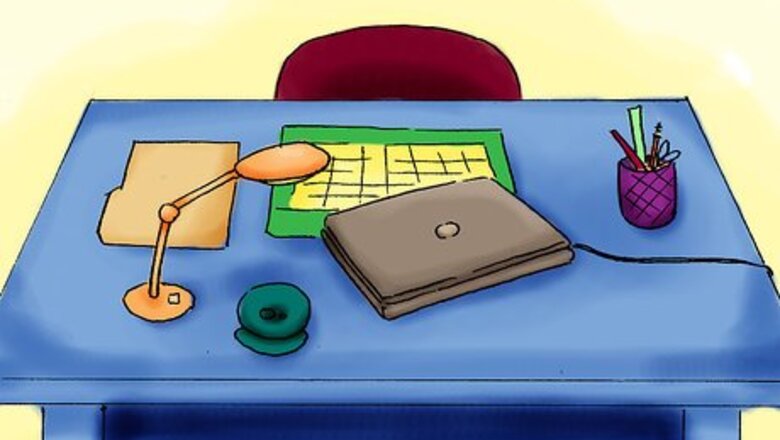
views
X
Trustworthy Source
Nature
Respected Multidisciplinary Scientific Journal
Go to source
Still, sometimes it's unavoidable. You've got a test bright and early the next morning and there's no other alternative. Keep reading to find some good tips to stay calm and save your grade!
Before You Cram
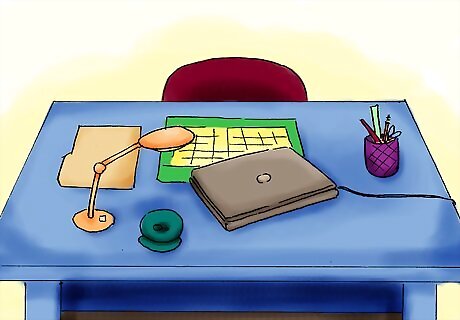
Find a nice quiet spot to study. Make sure it's not comfortable (like on your bed or sprawling out on the couch) because you will risk falling asleep. Find or create a well-lit area. When it's too dark around you, your body thinks, "Hey! It's time to hit the hay!" Fool it by turning on plenty of lights, simulating daytime.
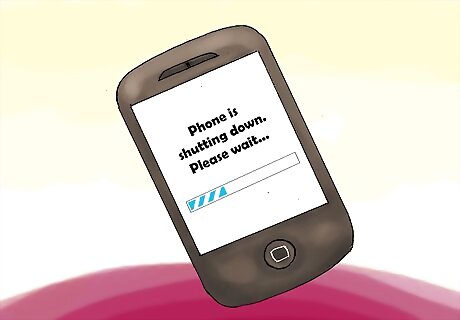
Remove yourself from all distractions. That means putting your phone away. You may have spent the entire semester texting during lectures, and this may be your punishment. Turn it off. While you're at it, stay away from the iPad and laptop, too (unless you have study material on your computer) -- Facebook, fantasy baseball, and Pinterest do not exist in your book right now.
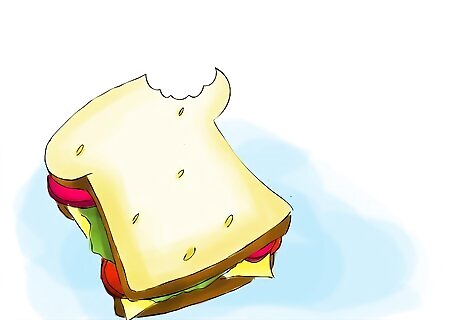
Eat something healthy. You may think 16 cans of cold Red Bull and five Snickers bars are the best way to go, but, sadly, they're not. Hyping yourself up on caffeine may keep you awake initially, but you'll just end up crashing harder later -- when it's actually test time. Go for fruits. An apple does a better job at keeping you focused and awake than caffeine. It's higher in natural sugars and it is nutritious. Nutrition should be thought of as energy in this circumstance. If you're full, you won't be thinking about food, another reason you'll be able to stay focused.

Set your alarm. Alright, so, worse comes to worst: You wake up in a pile of apple cores with ink emblazoned onto your cheek because you fell asleep on your chemistry notes. But you remembered to set your alarm, so you're not going to miss the test. So, do it now, before you accidentally fall asleep. You may be grateful that you did.
As You Cram

Stay calm. This part may be hard but just take a deep breath and try to gather your thoughts! Remember where you left all those textbooks and gather together some spare pieces of paper and pens. Highlighters and flashcards are also a good idea. If you still have your syllabus, great. Use it as an outline. The topics that pop up more than once are likely to be on the test.

Start at the beginning; don't focus on the little details! Concentrate on the bigger picture -- highlight the important facts that you think could be on the test. Also remember to look closely at the vocabulary! It will obviously help your understanding if you know what a word means. Read the chapter summaries (they usually do a good job at summarizing the important points). If there are no chapter summaries, then skim through the text and write down key ideas.
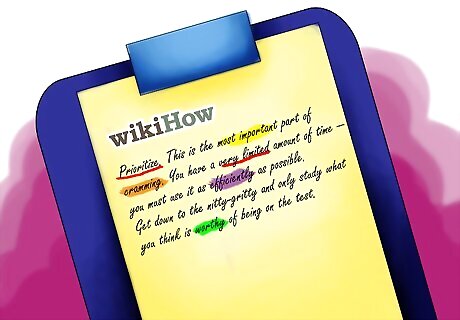
Prioritize. This is the most important part of cramming. You have a very limited amount of time -- you must use it as efficiently as possible. Get down to the nitty-gritty and only study what you think is worthy of being on the test. Focus on the main ideas and learn key formulas. Skip the details for now and only come back to them if you see that you have time after you have learned the key points. Don't attempt to learn everything; focus on things that will get you the most points on the exam. If your professor said the essay will be 75% of your grade, you're best off preparing for that and skipping the multiple choice.

Write out important info or recite small bits out loud. This will help your brain process the material better. If you just skim your textbooks or notes you probably won't remember anything! If you're lucky enough to have an insomniac for a roommate, grab them. Ask them to listen to you spout off about certain concepts. Relaying information to another individual is a surefire way to guarantee you understand the ins and outs of the ideas.

Make flash cards. This is a good way to quiz yourself and it also helps you process the information when you write out the flashcards and read them out loud! Use different colors for different topics or chapters. Look for parallels, metaphors, and other memory-triggers to help you wrap your brain around complicated concepts. Write the keywords of your metaphor down to jog your memory while studying. Write the information down in mnemonic devices. Dumb Kids Playing Catch On Freeway Get Squashed --Domain, Kingdom, Phylum, Class, Order, Family, Genus, Species (for a happy example).

Take breaks. It may seem counter-intuitive, but your brain will be able to process more information if you're not so hard on it. Study in bursts -- cramming like the Energizer bunny is inefficient and saturates your mind, preventing it from taking in more. Though you're studying a bit less, you'll be retaining more. After 45 minutes or so, get up. Stretch your body and walk around. Grab a drink, get a snack, and hop back to it in 5 to 10 minutes. You should feel a bit more refreshed and ready for action.
After You Cram

Go to bed. If you stay up all night you will be so tired in the morning chances are you won't remember anything! Get up in the morning about 30-45 minutes earlier and familiarize yourself with the highlighted parts of your notes and textbooks. If you made flashcards, go through them again. Try to get in at least 3 hours; that's one full sleep cycle. Waking up in the middle of one less than well-rested will be detrimental to your test score.

Eat breakfast. You've heard from everybody that a nutritious meal before an exam will help you use your brain better. Stick to a fairly normal breakfast (you don't want to get sick) and don't load up on anything too heavy if you have anxiety. Think about this: The more food you eat before your exam, the less you will be thinking about how hungry you are, so help yourself by just eating something before your exam so you can stay at least somewhat focused.

Take a deep breath. Go through the information a couple of times on your way to school. Chances are if you paid attention in class and got in some good studying the night before you should be fine.

Ask your friend to quiz you before the test. There's likely a few minutes before the teacher walks in, so utilize them! Take turns asking each other questions. Start with the points you are foggiest on -- that way they'll be fresh in your memory. Don't do this while you're taking the test -- getting caught cheating will result in a much worse score than you were going to get if you hadn't.




















Comments
0 comment